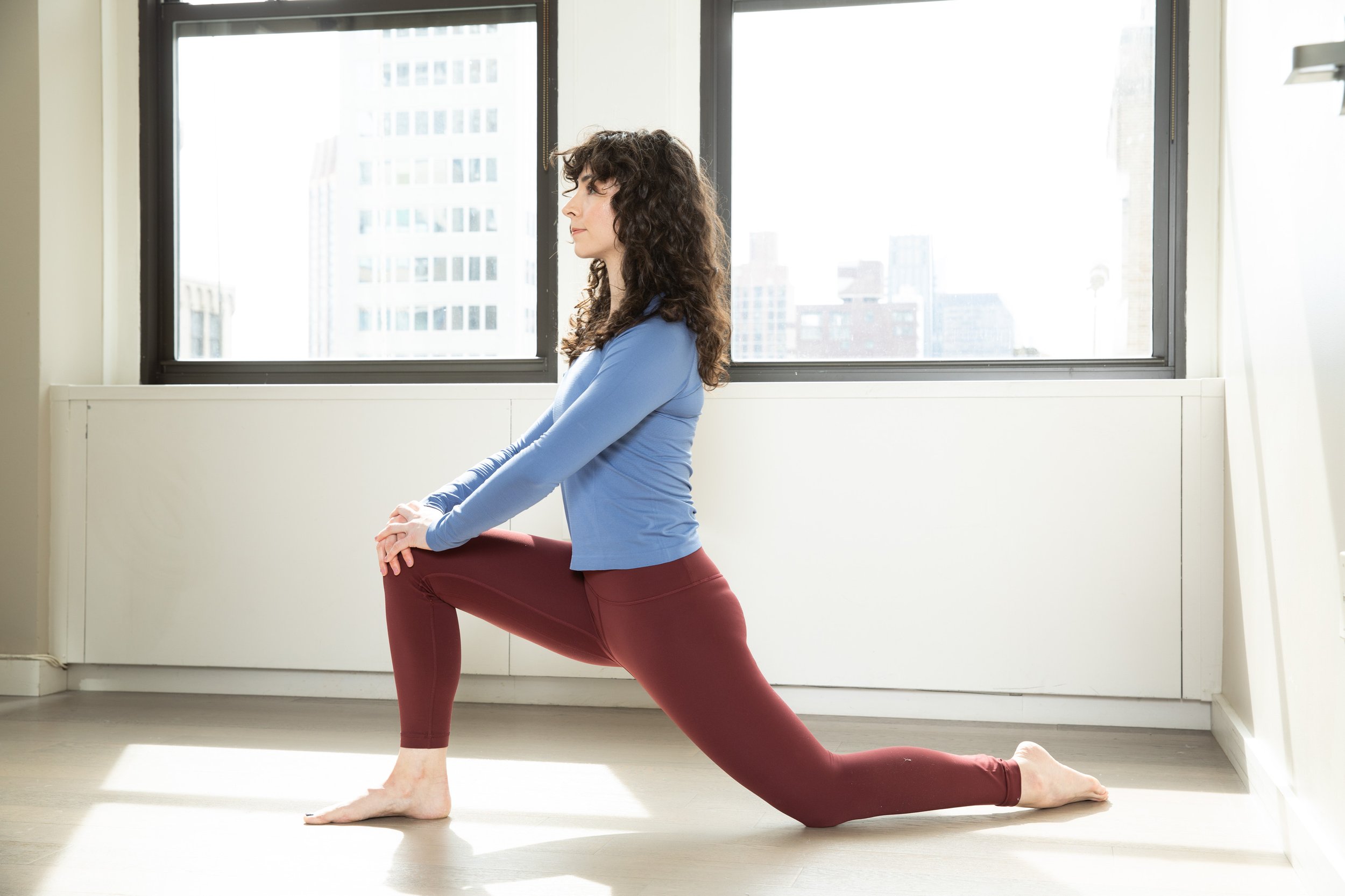
Yoga For Pelvic Floor
Yoga for Treating Pelvic Floor Pain & Disorders
Yoga for the pelvic floor focuses on bringing mobility to muscles in and around your pelvic floor.
Integrated yoga and pelvic floor physical therapy can help relieve pain resulting from pelvic floor dysfunction and improve the strength and coordination of pelvic floor muscle contractions.
The Pelvic Floor Tension Domino Effect
Tension in any part of your body can easily cause a domino effect if not treated promptly. If one muscle is tight, it can tug on structures all around it. Patients with pelvic floor tightness can experience pain in their hips, low back, knees, even all the way down to their feet and up to their jaw!
If you have pain in any part of your body, it’s common to “guard” or tense nearby muscles to minimize discomfort or protect yourself from further irritation.
People who suffer from urinary incontinence sometimes guard because they are anxious about leaking. Someone with pelvic floor muscles dysfunction may guard by over activating their pelvic floor muscles or the nearby muscles in their hips and thighs.
If you spend too much time tensing any muscle, the muscle won’t be able to relax enough to perform a proper contraction. This means that tension can actually make your muscles weaker.
Other muscles may try to do the job of the muscle that isn’t functioning poorly. This creates imbalances in the body, and the cycle of pain and guarding can spread.
Benefits of Yoga for Pelvic Floor
Yoga for Pelvic Floor incorporates mindful breathing, stretching and strengthening exercises. Your pelvic floor physical therapist can create a program specific to your needs.
These are just some of the conditions that may benefit from incorporated yoga and pelvic floor physical therapy:
Leaking when coughing or sneezing (urinary incontinence)
Urge to run to the bathroom (urinary urgency)
Multiple trips to the bathroom at night (nocturia)
Trouble controlling gas
Chronic pelvic/vaginal pain
Constipation
Difficulty with bowel movements
Difficulty with urination
Discomfort in the lower back, groin, abdomen, hips, and legs
Painful intercourse (sometimes after giving birth)
Example Yoga Poses
Before doing the poses above, consult a physical therapist to avoid injury. While these are gentle and low-intensity poses, doing them with improper form may do more harm than good.
A physical therapist will know which poses and variations are suited to an individual’s body and will prevent further aggravation of pelvic pain.
DIY vs. Professional Pelvic Floor Yoga
The internet, as vast as it is, certainly has the information patients need to do pelvic floor yoga on their own. So why even hire a professional to help?
Safety. Licensed physical therapists know the risks involved in each movement. So, while yoga poses may look simple, a professional can easily spot rookie mistakes and prevent injury.
Holistic treatment. Most internet sources take a conservative, general approach to relaying medical information. What works for one patient may not work for another. Hiring an experienced physical therapist means that the patient receives treatment that’s tailored to their needs.
Faster recovery. Since trained professionals know the right way to treat a patient, recovery will be faster. Uninformed patients that do-it-themselves risk performing yoga poses that are totally irrelevant to their condition, delaying recovery and wasting time.
While it may be hard to swallow the additional cost for professional treatment, it’s best to remember that physical therapists have the patient’s best interest in mind.
Treat pelvic pain right away.
Pelvic pain isn’t something anyone should ignore.
We know very well how troublesome untreated pelvic problems can be, and if left untreated, they can potentially worsen, which can decrease one’s quality of life.
For those currently experiencing any of the issues we mentioned above, please talk to a pelvic floor specialist immediately.
Book Appointment
The specialists at FemFirstHealth treat patients at our Midtown and Upper West Side offices in New York City.
If you or someone you know would benefit, contact us to book an appointment.
Click here to contact us or call us directly at (646) 678-3034.
FAQs
Can pelvic floor yoga help treat urinary incontinence?
Yes, yoga for the pelvic floor can treat incontinence. Incontinence is the lack of voluntary control over urination/defecation, and it can be caused by a weakened pelvic floor. Pelvic floor yoga helps strengthen, stabilize, and soften a patient’s pelvic floor, which can help a patient regain urinary control.
Can pelvic floor yoga treat menstrual cramps?
Yes. A study found that physical therapy programs (including yoga) helped significantly in strengthening, stretching, and relaxing the pelvic floor, significantly reducing dysmenorrheic pain during the menses.
Can pelvic floor yoga treat endometriosis?
Though there is currently no cure for endometriosis, pelvic floor yoga does a good job of helping patients manage their symptoms and relieve their pain. But as for complete treatment, endometriosis requires more than just pelvic floor yoga.
Can pelvic floor yoga treat pelvic organ prolapse?
Yes. But only when the patient is careful. Some yogic practices (like Mulabandha) may be beneficial to pelvic organ prolapse. Some exercises, however, can increase intra-abdominal pressure (IAP), which may aggravate pelvic organ prolapse. For more information, read this post.
Can pelvic floor yoga help with sex?
Yes. In addition to strengthening and stabilizing the pelvic floor for reduced pain and risk of disorder, pelvic floor yoga can also be beneficial to sexual function. Yoga for the pelvic floor can help improve body awareness and control of the muscles that need to relax to have pain-free penetrative sex.
